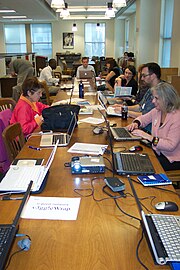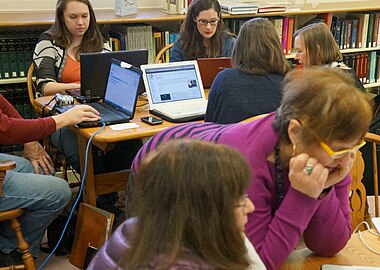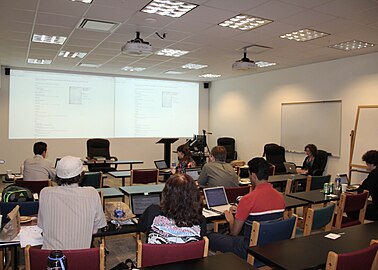Grants:PEG/WM US-DC/Projects 2014/Report
- Report accepted
- To read the approved grant submission describing the plan for this project, please visit Grants:PEG/WM US-DC/Projects 2014.
- You may still comment on this report on its discussion page, or visit the discussion page to read the discussion about this report.
- You are welcome to Email grants at wikimedia dot org at any time if you have questions or concerns about this report.
Project status
[edit]- Did you comply with the requirements specified by WMF in the grant agreement?
- Yes
- Is your project completed?
- Yes
Activities and lessons learned
[edit]Activities
[edit]Content programs
[edit]Over the course of the fiscal year, Wikimedia DC supported a total of 21 edit-a-thons in partnership with 13 separate cultural, academic, and professional institutions, including the Smithsonian Institution, the National Archives and Records Administration, the Library of Congress, the University of Delaware, the University of Maryland, George Washington University, the National Museum of Women in the Arts, the Phillips Collection, the Laurel Historical Society, the D.C. Historical Society, the American Statistical Association, the American Chemical Society, and Frederick County Public Libraries. Several of these edit-a-thons were organized with the assistance of Andrew Lih, professor of journalism at American University and longtime Wikipedia editor, who teaches a graduate-level course on Wikipedia and public knowledge.
| Edit-a-Thons by Month | Edit-a-Thons by Partner Institution |
|---|---|
|
1
2
3
4
5
Q1
Q2
Q3
Q4
|
1
2
3
4
5
6
7
8
9
10
Q1
Q2
Q3
Q4
|
| Average Edit-a-Thon Attendance by Month | |
|
5
10
15
20
25
30
Q1
Q2
Q3
Q4
|
The edit-a-thons were attended by a total of 137 volunteer participants, who collectively made 1019 edits to Wikipedia and other Wikimedia projects, adding a total of 290,453 bytes of content. Of these, 276 edits, corresponding to 64,599 bytes of content content, were made by newcomers, while 743 edits, corresponding to 225,854 bytes of added content, were made by experienced editors.
-
Edit-a-thon at the Smithsonian Libraries, October 2013
-
Edit-a-thon at the Laurel Museum, November 2013
-
Edit-a-thon at the National Museum of Women in the Arts, February 2014
-
BBC interviewer at Wikimedia DC's Women in the Arts editathon, March 2014
-
Edit-a-thon at the University of Delaware, April 2014
-
Edit-a-thon at the Frederic County Public Libraries, June 2014
-
Edit-a-thon at the University of Maryland, August 2014
Wikimedia DC additionally held one scan-a-thon with the National Archives and Records Administration, resulting in the digitization of 116 records.
Technology programs
[edit]Over the course of the fiscal year, Wikimedia DC supported 3 hack-a-thons in partnership with the Smithsonian Institution, the Sunlight Foundation, and the National Archives and Records Administration. The two Open Government WikiHack events focused on the topic of open government data, including the use of Wikidata as a bridge between open data repositories and Wikipedia entries, such that in the long term, tools could be developed to automatically update Wikipedia articles. Wikimedia DC invited James Forrester to deliver an instructional lecture on Wikidata during the second Open Government WikiHack at the National Archives.
Projects developed during the hack-a-thons included:
- A National Archives authority data tool, including the importation of author ID numbers into Wikidata. With the help of a script, participants were able to import NARA ID numbers into Wikidata en masse, allowing for their use in Wikipedia articles alongside other authority controls such as VIAF. The source code for the script is available on GitHub.
- A Sunlight Foundation API data tool, involving the myriad data repositories made available by the Sunlight Foundation. This data was used for creating entries on Wikidata on sessions of the United States Congress, such as the 112th United States House of Representatives, and helped to improve some Wikipedia articles.
- A tool for comparing disease descriptions, using data from the National Library of Medicine as a source. The idea was developed on the event's HackPad, but technical limitations impeded further development.
-
Hack-a-thon at the Luce Foundation Center, November 2013
-
Hack-a-thon at the National Archives, April 2014
-
Hack-a-thon at the National Archives, April 2014
National outreach grants program
[edit]Wikimedia DC provides small grants to individuals, community groups, and nonprofit organizations to fund activities aligned with our mission to advance general knowledge and to collect, develop, and disseminate educational content under a free license or in the public domain.
In Fiscal Year 2013–14, Wikimedia DC received six grant applications with a total value of $1,753.72 from individuals and organizations across the United States. Based on these applications, five grants (corresponding to 83.3% of the submitted applications) with a total value of $1,403.72 (corresponding to 80.0% of the total amount requested) were approved and funded. The grants provided by Wikimedia DC were used to fund activities and events in Laurel, Maryland; Boston, Massachusetts; Brooklyn, New York; and Portland, Oregon. Of the $1,403.72 in awarded grant funding, $500.00 was refunded from a canceled project, resulting in a net amount of $903.72 being awarded.
Lessons learned
[edit]- What worked well?
- Many organizations were interested in hosting edit-a-thons with us, allowing us to host 21 of them over the course of several months. They are very effective promotional events for Wikimedia DC. Our Open Government WikiHack series also put us in touch with many people and organizations that share our goal of increased access to information, and inviting James Forrester to DC helped us learn more about the novel Wikidata project that we expect to be of strategic importance to us over the next several years.
- What didn't work?
- It is difficult to determine the exact impact of our Open Government WikiHack series on the Wikimedia projects. We generated ideas through these hack-a-thons, but it has been difficult to put these ideas into action, due in part to people's limited understanding of Wikidata and Wikidata's limitations as a new project. We will continue to work on our Wikidata outreach; our Projects 2015 grant proposal focuses on sponsoring other organizations' hack-a-thons in lieu of planning our own events. We also spent far more money on maintaining a mobile Internet subscription given the relatively few times we needed it.
- What would you do differently if you planned a similar project?
- Our Projects 2015 grant reflects our changes for the 2014–15 fiscal year. Namely, our technology programs will focus more on local outreach, and our small grants program will be more actively promoted at Wikimedia events. We also will be purchasing temporary passes for mobile Internet access as needed, rather than maintaining a costly subscription.
Learning patterns
[edit]- Bringing your students to edit-a-thons – new pattern
- Digitizing archival records – new pattern
- Set up a GitHub profile for your hack-a-thons – new pattern
- Collecting usernames for in-person events – endorsed, linking to Wikimedia DC's opt-in form. (The form itself was already on Meta but for some reason not linked to from the learning pattern.)
Outcomes and impact
[edit]Outcomes
[edit]- Provide the original project goal here.
- Edit-a-thons: Holding events with eight institutions (including two new institutions), holding six events with the Smithsonian Institution, 50 volunteer contributors logging at least 700 volunteers hours and creating or improving at least 175 articles
- Scan-a-thons: Hosting two scan-a-thons, digitizing at least 50 documents
- Hack-a-thons: Hosting three hack-a-thons resulting in at least two completed technical projects
- Did you achieve your project goal? How do you know your goal was achieved? Please answer in 1 - 2 short paragraphs.
- Our table below details which targets we met and did not meet.
Progress towards targets and goals
[edit]Global Metrics
[edit]We are trying to understand the overall outcomes of the work being funded across our grantees. In addition to the measures of success for your specific program (in above section), please use the table below to let us know how your project contributed to the Global Metrics. We know that not all projects will have results for each type of metric, so feel free to put "0" where necessary.
- Next to each required metric, list the actual outcome achieved through this project.
- Where necessary, explain the context behind your outcome. For example, if you were funded for an edit-a-thon which resulted in 0 new images, your explanation might be "This project focused solely on participation and articles written/improved, the goal was not to collect images."
For more information and a sample, see Global Metrics.
| Metric | Achieved outcome | Explanation |
| 1. # of active editors involved | 89 | As measured at our edit-a-thons, including the activity at those edit-a-thons. |
| 2. # of new editors | 54 | As measured at our edit-a-thons. |
| 3. # of individuals involved | 137 | This does not include hack-a-thon participants, for which there is registration data but not attendance data. It includes scan-a-thon attendees by dint of the scan-a-thon participants also being edit-a-thon participants. |
| 4. # of new images/media added to Wikimedia articles/pages | This metric was not systematically tracked and is not included in this report. | |
| 5. # of articles added or improved on Wikimedia projects | 214 | As measured from our edit-a-thons, but not our hack-a-thons (in the event articles were improved there). |
| 6. Absolute value of bytes added to or deleted from Wikimedia projects | 280,590 | As measured from our edit-a-thons, not including contributions to Wikimedia projects from our other events. |
- Learning question
- Did your work increase the motivation of contributors, and how do you know?
- We did not track contributor motivation during this project, but we will be for future projects.
Impact
[edit]What impact did this project have on WMF's mission and the strategic priorities?
Option A: How did you increase participation in one or more Wikimedia projects?
- We increased participation by bringing Wikimedia to our audience. Our events held throughout the year introduced numerous people and institutions to the idea that Wikipedia is edited by ordinary people, and to this end, we recruited new participants to Wikipedia. Our events also provide a safe and welcoming environment for people to edit Wikipedia who may not otherwise edit Wikipedia on their own time.
Option B: How did you improve quality on one or more Wikimedia projects?
- The edit-a-thons we held resulted in the direct improvement of Wikipedia articles, while our scan-a-thon resulted in 116 new digital documents that will be uploaded to Commons. Our hack-a-thons (especially the Open Government WikiHack series) started a longer-term conversation about directly linking data repositories with the promising Wikidata project.
Option C: How did you increase the reach (readership) of one or more Wikimedia projects?
- Our events unlikely increased readership of Wikipedia—most people around here already use Wikipedia—but we believe they introduce new information about how the Wikimedia projects are powered by volunteers.
Reporting and documentation of expenditures
[edit]This section describes the grant's use of funds
Documentation
[edit]- Did you send documentation of all expenses paid with grant funds to grants at wikimedia dot org, according to the guidelines here? Answer "Yes" or "No".
- Documentation will be sent to the Wikimedia Foundation.
Expenses
[edit]- Please list all project expenses in a table here, with descriptions and dates. Review the instructions here.
| Item | Budget (Original) | Budget (Revised) | Actual | Difference | Note |
|---|---|---|---|---|---|
| Direct program costs | |||||
| Edit-a-thons | $4,200.00 | $1,200.00 | $993.58 | -17.2% | Our original budget totally overestimated how much each edit-a-thon cost. Additionally, we were able to hold several edit-a-thons with food contributed in-kind, or with light refreshments instead of full meals. |
| Hack-a-thons | $3,000.00 | $3,000.00 | $2,443.02 | -18.6% | We held only two hack-a-thons instead of three, spending slightly more on the second hack-a-thon to bring James Forrester to DC (with WMF permission). |
| Scan-a-thons | $1,000.00 | $0.00 | $0.00 | — | We held only one scan-a-thon, exceeding our document digitization goals for the year, at no cost to Wikimedia DC. |
| National outreach grants | $1,000.00 | $1,000.00 | $75.20 | -92.5% | We awarded grants for lower amounts of money this year compared to the prior year. (Some grants were funded through other budget lines, including from unrestricted funds.) |
| Total direct program costs | $9,200.00 | $5,200.00 | $3,511.80 | -32.5% | |
| Program overhead cost | |||||
| Internet connectivity | $660.00 | $660.00 | $494.91 | -25.0% | We budgeted for an entire year even though the grant was for a period less than one year. |
| Total costs | $9,860.00 | $5,860.00 | $4,006.71 | -31.6% | |
- Total project budget (from your approved grant submission)
- Originally $9,860, then $5,860 after $4,000 was reinvested in the Workshop Facilitator Training grant.
- Total amount requested from WMF (from your approved grant submission, this total will be the same as the total project budget if PEG is your only funding source)
- $9,860 (revised to $5,860)
- Total amount spent on this project
- $4,006.71
- Total amount of Project and Event grant funds spent on this project
- $4,006.71
- Are there additional sources that funded any part of this project? List them here.
- Exclusively WMF funds were used on this project.
Remaining funds
[edit]- Are there any grant funds remaining?
- Answer YES or NO.
- Yes
- Please list the total amount (specify currency) remaining here. (This is the amount you did not use, or the amount you still have after completing your grant.)
- $1,853.29
- If funds are remaining they must be returned to WMF, reallocated to mission-aligned activities, or applied to another approved grant.
- Please state here if you intend to return unused funds to WMF, submit a request for reallocation, or submit a new grant request, and then follow the instructions on your approved grant submission.
- We would like to apply the leftover funds toward our Projects 2015 grant proposal.










